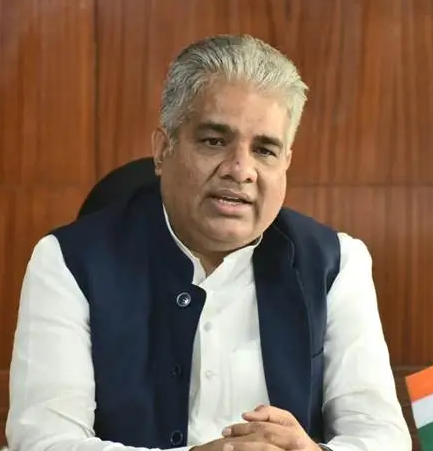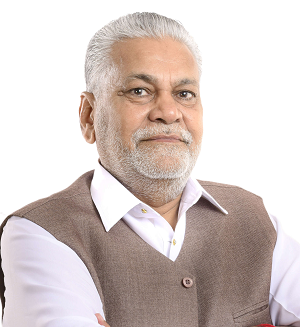The 27th Conference of Parties (COP27) drew to a close last week and despite the many challenges and divergence of views, member countries rose to the occasion. With COP27 being branded as the COP for Implementation, significant breakthroughs were achieved on key issues, the primary being the agreement on Loss and Damage funding, adaptation and encouraging mitigation work programme which tackles emission reduction headfirst and catalyses impactful implementation that keeps the global community on track towards the more ambitious Paris Agreement goal of keeping global temperature rise to 1.5°C above pre industrial levels.
From India’s standpoint the outcomes of COP27 have been significant as they accommodate concerns, views and suggestions proposed by India both individually or as the collective voice of developing nations. The Sharm el-Sheikh Implementation Plan recognises that limiting global warming to 1.5°C requires rapid, deep and sustained reductions in global greenhouse gas emissions of 43% by 2030 relative to the 2019 level. The Plan also recognises that “this requires accelerated action in this critical decade, on the basis of equity and the best available scientific knowledge, reflecting common but differentiated responsibilities and respective capabilities [CBDR-RC] in the light of different national circumstances and in the context of sustainable development and efforts to eradicate poverty”.
India has been a vocal supporter of the CBDR-RC approach in setting and meeting climate action targets for nations to ensure that in this joint fight to save the planet from the vagaries of climate change we remain mindful of historic polluters and the technological and financial gap that developing countries need to cover in order to make the green switch.
The Implementation Plan urged Parties “that have not yet communicated new or updated nationally determined contributions to do so as soon as possible”. India is not only among the 29 countries to have submitted its enhanced NDCs after COP26, but is also on the list of less than 60 parties that have submitted their Long-Term Low Emission Development Strategy within one year of its net zero announcement at Glasgow. The steps reflect the Narendra Modi government’s commitment to be part of solutions in battling climate change.
Making a pitch for countries to move towards low-carbon development, the COP27 Implementation Plan calls for “targeted support to the poorest and most vulnerable in line with national circumstances and recognising the need for support towards a just transition.” It recognised that “enhanced support for developing countries Parties will allow for higher ambition in their actions.”
India highlighted that for most developing countries just transition cannot be equated with decarbonization, but with low-carbon development and that developing countries need independence in their choice of energy mix, and in achieving the SDGs.
COP27 underlined the importance of focusing on all climate actions – mitigation, adaptation, finance, technology transfer and capacity building – not just mitigation. The COP27 Plan noted “with serious concern the existing gap between current levels of adaptation and levels needed to respond to the adverse effect of climate change in line with findings from the contributions of Working Group II to the Intergovernmental Panel on Climate Change Sixth Assessment Report.”
It urged Parties to adopt a transformational approach to enhancing capacity, strengthening resilience and reducing vulnerability to climate change. It also urged developing country Parties “to urgently and significantly scale up their provision of climate finance, technology transfer and capacity-building for adaptation so as to respond to the needs of developing country Parties”. India has for long batted for the urgent need for giving due importance to adaptation and discussion on whether the scale of resources is commensurate with the scale of the needs of developing countries.
The COP27 Implementation Plan emphasizes that just and equitable transition encompasses pathways that include energy, socioeconomic, workforce and other dimensions, all of which must be based on nationally defined development priorities and include social protection so as to mitigate potential impacts associated with the transition, and highlights the important role of the instruments related to social solidarity and protection in mitigating the impacts of applied measures.
The Plan document expressed “serious concern that the goal of developed country Parties to mobilise jointly USD 100 billion per year by 2020 in the context of meaningful mitigation action and transparency on the implementation has not yet been met…”
For India, another significant aspect was the inclusion of ‘transition to sustainable lifestyles and sustainable patterns of consumption and production in the efforts to address climate change’ in the cover decision of the Sharm El-Sheikh Implementation Plan. This step is in consonance with Mission LiFE, which encourages Lifestyle for Environment, launched by Indian Prime Minister Narendra Modi with UN Secretary-General Antonio Guterres on October 20.
COP27 also sets the stage for moving towards the New Collective Quantified goal on Climate Finance under the Paris Agreement. It acknowledged the need for substantive progress in the deliberations on the New Collective Quantified Goal (NCQG) on climate finance, which will take into account the needs and priorities of developing countries, including quantity, quality, access and sources of funding.
As the Implementation Plan document focused on climate justice, addressing the concerns and issues faced by developing countries, India found its voice heard and captured in decisions at COP27. Prime Minister Modi, under whom several international initiatives such as International Solar Alliance and Coalition for Disaster Resilient Infrastructure have taken shape, has time and again reiterated that no country should be left behind in the fight against climate change. India has made a special pitch for countries most vulnerable to the vagaries of climate change and sought climate justice in climate negotiations.
COP27 has raised the pitch for urgent actions and implementation of promises in all areas from finance to adaptation. As India contributes significantly to the fight against climate change, it hopes that the global community, especially developed countries, will keep their promises too.
(The Author is Union Cabinet Minister for Environment, Forest & Climate Change; and Labour & Employment)








